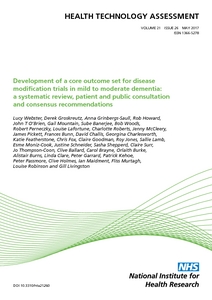Webster, L;
Groskreutz, D;
Grinbergs-Saull, A;
Howard, R;
O'Brien, JT;
Mountain, G;
Banerjee, S;
Woods, B;
Perneczky, R;
Lafortune, L;
et al.
Webster, L; Groskreutz, D; Grinbergs-Saull, A; Howard, R; O'Brien, JT; Mountain, G; Banerjee, S; Woods, B; Perneczky, R; Lafortune, L; Roberts, C; McCleery, J; Pickett, J; Bunn, F; Challis, D; Charlesworth, G; Featherstone, K; Fox, C; Goodman, C; Jones, R; Lamb, S; Moniz-Cook, E; Schneider, J; Shepperd, S; Surr, C; Thompson-Coon, J; Ballard, C; Brayne, C; Burke, O; Burns, A; Clare, L; Garrard, P; Kehoe, P; Passmore, P; Holmes, C; Maidment, I; Murtagh, F; Robinson, L; Livingston, G
(2017)
Development of a core outcome set for disease modification trials in mild to moderate dementia: a systematic review, patient and public consultation and consensus recommendations.
HEALTH TECHNOLOGY ASSESSMENT, 21 (26).
p. 1.
ISSN 1366-5278
https://doi.org/10.3310/hta21260
SGUL Authors: Garrard, Peter
![[img]](https://openaccess.sgul.ac.uk/108942/1.hassmallThumbnailVersion/3010496.pdf)  Preview |
|
PDF
Published Version
Available under License ["licenses_description_publisher" not defined].
Download (6MB)
| Preview
|
Abstract
Background
There is currently no disease-modifying treatment available to halt or delay the progression of the disease pathology in dementia. An agreed core set of the best-available and most appropriate outcomes for disease modification would facilitate the design of trials and ensure consistency across disease modification trials, as well as making results comparable and meta-analysable in future trials.
Objectives
To agree a set of core outcomes for disease modification trials for mild to moderate dementia with the UK dementia research community and patient and public involvement (PPI).
Data sources
We included disease modification trials with quantitative outcomes of efficacy from (1) references from related systematic reviews in workstream 1; (2) searches of the Cochrane Dementia and Cognitive Improvement Group study register, Cochrane Central Register of Controlled Trials, Cumulative Index to Nursing and Allied Health Literature, EMBASE, Latin American and Caribbean Health Sciences Literature and PsycINFO on 11 December 2015, and clinical trial registries [International Standard Randomised Controlled Trial Number (ISRCTN) and clinicaltrials.gov] on 22 and 29 January 2016; and (3) hand-searches of reference lists of relevant systematic reviews from database searches.
Review methods
The project consisted of four workstreams. (1) We obtained related core outcome sets and work from co-applicants. (2) We systematically reviewed published and ongoing disease modification trials to identify the outcomes used in different domains. We extracted outcomes used in each trial, recording how many used each outcome and with how many participants. We divided outcomes into the domains measured and searched for validation data. (3) We consulted with PPI participants about recommended outcomes. (4) We presented all the synthesised information at a conference attended by the wider body of National Institute for Health Research (NIHR) dementia researchers to reach consensus on a core set of outcomes.
Results
We included 149 papers from the 22,918 papers screened, referring to 125 individual trials. Eighty-one outcomes were used across trials, including 72 scales [31 cognitive, 12 activities of daily living (ADLs), 10 global, 16 neuropsychiatric and three quality of life] and nine biological techniques. We consulted with 18 people for PPI. The conference decided that only cognition and biological markers are core measures of disease modification. Cognition should be measured by the Mini Mental State Examination (MMSE) or the Alzheimer’s Disease Assessment Scale – Cognitive subscale (ADAS-Cog), and brain changes through structural magnetic resonance imaging (MRI) in a subset of participants. All other domains are important but not core. We recommend using the Neuropsychiatric Inventory for neuropsychiatric symptoms: the Disability Assessment for Dementia for ADLs, the Dementia Quality of Life Measure for quality of life and the Clinical Dementia Rating scale to measure dementia globally.
Limitations
Most of the trials included participants with Alzheimer’s disease, so recommendations may not apply to other types of dementia. We did not conduct economic analyses. The PPI consultation was limited to members of the Alzheimer’s Society Research Network.
Conclusions
Cognitive outcomes and biological markers form the core outcome set for future disease modification trials, measured by the MMSE or ADAS-Cog, and structural MRI in a subset of participants.
Future work
We envisage that the core set may be superseded in the future, particularly for other types of dementia. There is a need to develop an algorithm to compare scores on the MMSE and ADAS-Cog.
Study registration
The project was registered with Core Outcome Measures in Effectiveness Trials [www.comet-initiative.org/studies/details/819?result=true (accessed 7 April 2016)]. The systematic review protocol is registered as PROSPERO CRD42015027346.
Funding
The National Institute for Health Research Health Technology Assessment programme.
| Item Type: |
Article
|
| Additional Information: |
© Queen’s Printer and Controller of HMSO 2017. This work was produced by Webster et al. under the terms of a commissioning contract issued by the Secretary of State for Health. This issue may be freely reproduced for the purposes of private research and study and extracts (or indeed, the full report) may be included in professional journals provided that suitable acknowledgement is made and the reproduction is not associated with any form of advertising. Applications for commercial reproduction should be
addressed to: NIHR Journals Library, National Institute for Health Research, Evaluation, Trials and Studies Coordinating Centre, Alpha House, University of Southampton Science Park, Southampton SO16 7NS, UK. |
| Keywords: |
Health Policy & Services, 1117 Public Health And Health Services, 0807 Library And Information Studies, 0806 Information Systems |
| SGUL Research Institute / Research Centre: |
Academic Structure > Molecular and Clinical Sciences Research Institute (MCS) |
| Journal or Publication Title: |
HEALTH TECHNOLOGY ASSESSMENT |
| ISSN: |
1366-5278 |
| Projects: |
|
| Web of Science ID: |
WOS:000403540800001 |
| Dates: |
| Date |
Event |
| 2017-05 |
Published |
| 2016-10 |
Accepted |
|
| URI: |
https://openaccess.sgul.ac.uk/id/eprint/108942 |
| Publisher's version: |
https://doi.org/10.3310/hta21260 |
Statistics
Item downloaded times since 10 Jul 2017.
Actions (login required)
 |
Edit Item |


